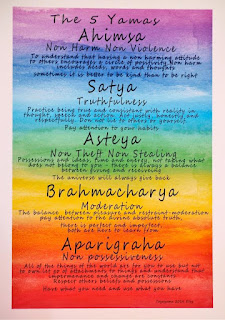The Five Yamas: Learning to Live a More Virtuous Life
By: Steph Ball-Mitchell, ERYT500, RPYT, RCYT, YACEP
By: Steph Ball-Mitchell, ERYT500, RPYT, RCYT, YACEP
I hope all of you enjoyed a prosperous 2018 and are prepared to continue your growth in mind, body and spirit through 2019. This year Online Yoga School is providing an additional stream of content for all of our subscribers to continue your development in the practice of yoga. Today we discuss the yamas, the first step of the first step in Patanjali's Yoga Sutras.

Over the next few weeks we’ll be updating our blog with a series of posts that discuss the Eight Limbs of Yoga, better know as Ashtanga. Ashtanga is Patanjali's eight-limb path that acts as a guide for us. It teaches self-discipline as well as moral and ethical conduct. Following the path that Ashtanga lays out will lead to experiencing a more purposeful life.

The first limb of Ashtanga, is the Yamas. The Yamas pertain to ethical conduct and examines how we conduct ourselves in our daily routines and in our interactions with our external world. Yamas can be broken down into five rules, or "yamas," that set a foundation for living a more ethical life.
Ahimsa is the practice of nonviolence. However, if we examine nonviolence through a less myopic lense we can understand that Ahimsa doesn’t only pertain to physical violence. In fact, the word “himsa” translates more directly to hurt. Ergo, the word “Ahimsa” translates more directly to “non-harmful”. Harmful activities can be emotional, physical and mental. Further, in order to truly understand and practice Ahimsa we must ensure that we not only avoid harming others, but we must also avoid harming ourselves. To practice ahimsa is to live harmoniously. It is to refrain from thinking or acting on negative thoughts about others or self.
To practice Satya is to be truthful in nature. Being truthful in nature isn’t limited to avoiding dishonesty. To be truthful in nature is to be true to yourself. To be true to yourself means to remember that you are not what you feel or what you did. You are who you are, and this is unchanging.
Asteya is the practice of non-stealing. Understand that stealing isn’t limited to material items. In this sense, it also isn’t limited to taking something in a deceitful manner. In this sense, non-stealing means not to take anything that isn’t offered to you freely. That could be someone else’s time or labor or ideas. Asteya is really focused on overcoming greed and reminding yourself that ‘I am enough’.
The word Brahma translates to “Creator”. So to practice Brahmacharya is to, in essence, practice behaviors that would lead you to the creator. Some people define this as continence or celibacy. In Yoga, we define Brahmacharya as the practice of restraint. Nobody is perfect and we all have our vices, but practicing restraint and moderation is the essence of Brahmacharya.
Aparigraha teaches non-attachment. This means non-attachment to material possessions. Material possessions are fleeting and will one day cease to exist. Instead, the motivation for our actions should be the actions themselves and the values behind those actions. You shouldn’t work hard in hopes of one day being able to afford a nice home or pool. You should work hard because you are a virtuous person who believes in the work that you do.
Practicing the five yamas is the first step on our journey to living a more virtuous and purposeful life. I hope that you found this post interesting and I look forward to providing more information pertaining to Yoga psychology in the coming weeks and over the course of the year.
If you’re interested in learning more about Yoga philosophy at your own pace, please visit our website and view our class offerings and be sure to keep reading about the Niyamas.
Namaste, yall.
More Information on Online Yoga Teacher Training
Founder of Online Yoga School and Yoga & Ayurveda Center
 Steph Ball-Mitchell, E-RYT-500, RPYT, RCYT, YACEP, CAADC
Steph Ball-Mitchell, E-RYT-500, RPYT, RCYT, YACEP, CAADC
Steph has over 25 years of experience in yoga and movement. Her understanding of yoga and the human body has been influenced by lifelong dancing and holistic health. She found her life’s purpose in helping people become happier and healthier through her own healing journey. Steph assists her students in knowing the joy and wonderment of integrating the mind and body through accessible yoga. She encourages an authentic and life-nurturing practice, one that brings greater consciousness to each moment and every movement of the body with a heavy emphasis on breath.
With a masters degree in counseling, Steph brings awareness, acceptance and a down to earth approach to her classes. She studied with Maty Ezraty and later completed her second 200-hour training with Nancy Candea at Yoga Impact in New Jersey and her 300-hour training with Chris Loebsack at Boundless Yoga Studio in Stroudsburg, Pennsylvania. The perpetual student, Steph has studied with Leslie Howard, Travis Eliot, Bryan Kest, Donna Farhi and countless others. She has extensive training in pelvic floor yoga, restorative yoga, yin yoga, power yoga and accessible yoga. Most recently, Steph was certified as a Grand Master of Meditation through Swami Vidyanand.
Steph founded Yoga and Ayurveda Center with her husband. She later launched Online Yoga School to support her local trainings and has recently launched a virtual yoga studio to accommodate the international community of trainees.
When she isn’t on her mat, Steph can be found volunteering, enjoying her husband and children, dancing and cooking. She currently enjoys serving on the board of World Yoga Federation and Meditation Alliance International and previously enjoyed serving on the Education Committee of Yoga Alliance and places a strong emphasis on inclusivity in her teacher trainings.